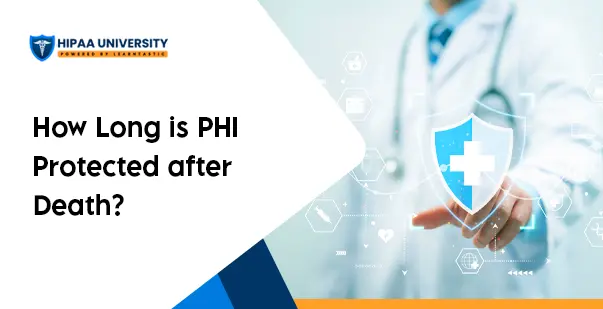Learn How Long is PHI Protected After Death?

August 26, 2024
Protected Health Information (PHI) doesn’t stop being private after someone passes away. Under HIPAA, there are still rules in place — and for a good reason. So, how long is PHI protected after death? Let’s break it down.
Maybe you’ve found yourself sitting in a doctor’s office, sharing personal details, and quietly wondering:
“How long is my health information kept private after I’m gone?”
You’re not alone — and it’s a really important question.
With more than 146 million Americans affected by PHI breaches, HIPAA (Health Insurance Portability and Accountability Act) puts strong safeguards in place. But things can get complicated when someone passes away. That’s where HIPAA compliance training becomes essential. Whether you’re in healthcare or managing someone’s estate, understanding what’s protected — and for how long — helps you stay compliant and respectful.
In this blog, we’ll walk you through how PHI is handled after death — in plain English — so you can understand your rights, your loved ones’ privacy, and what to do if you ever need access to those records.
How Long Is PHI Protected After Death Under HIPAA?
Let’s start with the big rule: PHI is protected for 50 years after death. Here’s what that really means:
- 50-Year Rule: A person’s PHI is treated with the same level of privacy after death as it was during their life — for a full five decades.
- Authorized Access: Only specific individuals, like personal representatives or estate executors, can legally access that PHI during the 50-year window.
-
- Exceptions to the Rule: In certain cases, like for public health concerns, organ donation, or legal mandates, PHI can be disclosed even within that protected timeframe.
- State Laws May Vary: HIPAA is a federal standard, but some states have additional laws that further extend or tailor PHI protections.
- What Happens After 50 Years? Once those 50 years are up, HIPAA protections no longer apply. At that point, other laws or ethical guidelines may still influence how it’s handled.
Who Can Access PHI After Death?
Just because PHI is protected after someone passes doesn’t mean it’s completely off-limits. There are some situations — and some people — who can legally access that information. It all depends on the role they play and why the data’s needed. Let’s take a look at who can get access and when.
- Personal Representatives
If someone is legally named as the executor, administrator, or personal representative of the estate, they usually have the right to access PHI. That’s because they’re the ones handling things like final bills, insurance paperwork, or legal affairs tied to the person’s passing. - Family Members
In some cases, family members can access PHI. This access might also help with ongoing care for surviving relatives or filling in important gaps in the family’s medical history. - Legal Requirements
Sometimes, the law steps in. A court order or law enforcement request might require a provider to release PHI — for example, to confirm the cause of death or settle a legal dispute involving the estate. - Public Health Authorities
If the situation involves public safety, PHI can be shared with health agencies. This might happen if there’s a concern about infectious disease, health trends, or reporting statistics like cause of death. - Organ and Tissue Donation
When someone is an organ or tissue donor, certain organizations need to review PHI to make sure donation is possible — and safe. These are tightly controlled cases that serve a clear purpose. - Research Use
PHI might also be used for medical research or public health studies, but only under strict guidelines. Researchers must meet specific standards, and the data is handled with care to protect privacy.
🔗 Read More: What is Considered Protected Health Information Under HIPAA?
Need PHI Access for a Loved One?
If you’ve lost a loved one, you might need access to their health records — whether it’s to understand medical history, finalize legal matters, or manage the estate.
Here’s a step-by-step breakdown of how to do that legally and respectfully:
- Confirm Your Legal Status: Are you the personal representative, executor, or court-appointed administrator? That’s usually a requirement for access.
- Gather the Required Documents: Be prepared to submit: a copy of the death certificate, proof of your legal role (like a court order), personal identification, sometimes a copy of the will or other legal paperwork.
- Contact the Healthcare Provider: Reach out to the hospital, clinic, or facility where your loved one received care. Ask them about their specific PHI request process.
- Complete the Necessary Forms: Providers often require a formal request or authorization form. Be sure to fill everything out clearly and completely.
- Submit Your Request: Depending on the provider, you may submit by mail, in person, or online. Always confirm the accepted method.
- Follow Up: A polite check-in can speed up the process — or alert you to any missing info that’s holding things up.
- Ask About Fees: Providers may charge fees to copy or process medical records. It’s best to ask about costs upfront.
- Know Your Rights: If your request is denied, you have the right to know why — and to seek legal advice if needed. Understanding your HIPAA and state-level rights is key.
What Are the Consequences of Violating PHI After Death?
Just because someone has passed away doesn’t mean their health information is up for grabs. HIPAA still applies, and when those rules are broken, there are consequences.
Here’s what can happen if PHI is mishandled after death:
- Legal Penalties
Depending on the situation, a violation can lead to serious fines — and we’re not talking small change. In some cases, penalties can run into the millions, especially when the breach is considered severe. - Civil Lawsuits
If PHI is shared without proper authorization, the family of the deceased can take legal action. These kinds of lawsuits can be both financially and emotionally costly. - Reputational Damage
When a healthcare organization violates HIPAA, it risks damaging its reputation with patients, clients, and the broader community.
- Criminal Charges
In the most serious cases — where there’s intentional or malicious misuse — the person responsible could face criminal prosecution. That means not just fines, but potentially jail time too. - Loss of Licensure or Accreditation
Hospitals, clinics, and care providers that mishandle PHI may be hit where it really hurts: their ability to operate. HIPAA violations can lead to revoked licenses, lost certifications, and a whole world of compliance trouble. - Regulatory Scrutiny
Once a violation is reported, it’s not just about dealing with that one incident. Organizations often face increased audits, investigations, and closer regulatory attention — all of which stretch time, money, and resources.
- Personal Accountability
This isn’t just about institutions. Individuals can also be held responsible — even if the violation was accidental. Job loss, suspension, or internal disciplinary action are all possible outcomes.
Conclusion: 50 Years of Protection, For a Reason
So, how long is PHI protected after death?
Fifty years.
It’s not just a rule — it’s a reflection of how seriously we’re expected to treat someone’s health information, even after they’re gone.
These protections aren’t just about ticking boxes on a compliance checklist. They’re about respect — for the deceased, and for the loved ones left behind. Privacy doesn’t expire at the end of life, and HIPAA helps ensure it’s upheld.
Whether you’re a healthcare provider, an estate manager, or simply trying to understand your responsibilities, knowing how HIPAA works after death is essential.





